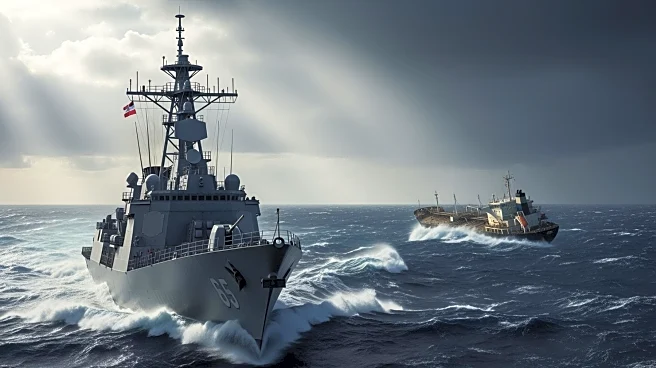What's Happening?
A European Union naval force has successfully reached the Malta-flagged tanker Hellas Aphrodite, which was seized by pirates off the coast of Somalia. The vessel, carrying gasoline from India to South Africa, was attacked with machine guns and rocket-propelled
grenades. The crew of 24 mariners managed to hide in a locked-down citadel aboard the ship. The EU's Operation Atalanta, an anti-piracy coalition, responded swiftly, deploying assets to the scene to ensure the safety of the crew and the vessel. The incident is part of a series of pirate attacks in the region, exacerbated by instability due to Yemen's Houthi rebels' actions in the Red Sea corridor.
Why It's Important?
The resurgence of piracy off the Somali coast poses significant threats to international shipping routes, impacting global trade and security. The attacks disrupt the transportation of goods, potentially leading to increased shipping costs and insurance premiums. The involvement of international forces like the EU's Operation Atalanta highlights the ongoing need for coordinated efforts to combat piracy and ensure maritime safety. The situation also underscores the broader geopolitical instability in the region, influenced by conflicts such as the Israel-Hamas war, which can have ripple effects on global security and economic stability.
What's Next?
The EU naval force continues to monitor the situation closely, with assets ready to respond to further incidents. The British military's United Kingdom Maritime Trade Operations center has issued warnings about potential pirate activity in the area. Efforts to strengthen international naval patrols and enhance security measures for vessels traveling through high-risk areas are likely to intensify. The international community may also seek to address the root causes of piracy, including political instability and economic hardship in Somalia, to prevent future incidents.
Beyond the Headlines
The resurgence of piracy in the region raises ethical and legal questions about the treatment of pirates and the protection of maritime workers. It also highlights the cultural stigma faced by local fishermen, who may be unfairly associated with piracy. Long-term solutions may involve addressing socio-economic conditions in Somalia and fostering regional cooperation to stabilize the area.
















